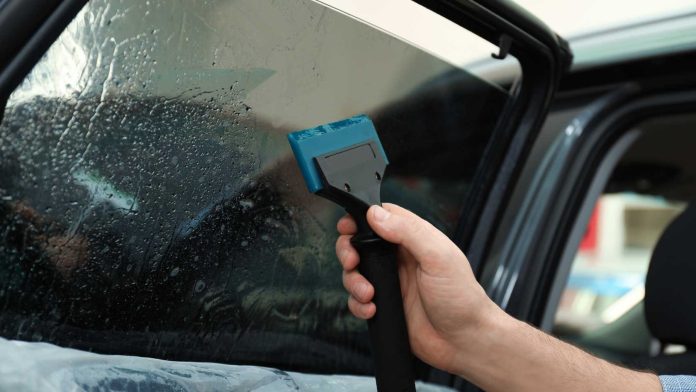Introduction: The Perplexing Phenomenon of Fading Tints
Car window tinting is a popular modification that offers privacy, UV protection, and a sleek aesthetic. However, it can be disheartening when the tint, once crystal clear, starts to exhibit signs of wear and tear, such as turning purple or developing unsightly bubbles. In this in-depth exploration, we will delve into the underlying causes of these problems and provide comprehensive solutions to ensure your window tint remains impeccable.
- Understanding Purple Tints: Causes and Prevention
- Cause: Purple tinting occurs due to the breakdown of the adhesive used in the tint film. Prolonged exposure to sunlight and heat accelerate adhesive deterioration, leading to a distinct purple hue.
- Prevention: Opt for high-quality tint films equipped with advanced UV-resistant technology. These films are specifically designed to resist adhesive degradation, significantly delaying the onset of the purple tint phenomenon. Regular cleaning and application of UV-protective coatings further enhance the longevity of your tint.
- Debunking Tint Bubbles: Causes and Solutions
- Cause: Bubbles surface when air or moisture becomes trapped between the tint film and the glass during installation. Poor installation techniques, usage of low-quality films, or rushing the installation process can result in the formation of bubbles.
- Solutions:
- Professional Installation: Employing the expertise of a skilled professional ensures meticulous installation, minimizing the risk of bubbles.
- Opt for Quality Films: Choose reputable brands with excellent customer reviews. High-quality films, while slightly more expensive, are durable, UV-resistant, and less prone to bubbling.
- Post-Installation Care: Allowing the tint to cure properly and refraining from rolling down windows for a few days post-installation prevents bubbles from forming.
- The Impact of Inferior Quality: Why Material Matters
- Inferior Tint Films: Cheap or substandard tint films lack essential UV inhibitors, making them susceptible to rapid degradation. Such films are prone to fading, turning purple, and developing bubbles in a short period.
- Investing in Quality: While premium films might come at a higher price, they are a wise investment. These films are designed to withstand prolonged UV exposure, maintaining their clarity, color, and integrity over time.
Conclusion: Empowering Car Owners with Knowledge
In conclusion, comprehending the factors behind purple tinting and bubbling empowers car owners to make informed decisions. By investing in professional tint installation, opting for high-quality, UV-resistant tint films, and adhering to proper post-installation care, you can ensure the longevity and aesthetic appeal of your window tint. Regular maintenance, coupled with careful choices during installation, guarantees that your tint remains flawless, free from the frustrating issues of purple hues and unsightly bubbles.

vurcazkircazpatliycaz.i3sEGjJGqHvK
vurucuteamgeldi.WANpXOdtPIEJ
daktilogibigibi.G3V7SXSwsHz7
daxktilogibigibi.BkrF9E1TDSUV
xyandanxvurulmus.oQVU5hDz4xtV
shapeup xyandanxvurulmus.EPP88DUr6sMA
perplexed xyandanxvurulmus.LP7xGNAwoc1N
bahis siteleri incest category vurgunyedim.jRySiJixVGUT
eski rahatiniz olmayacak yaralandinmieycan.X3SetRMGcnfY
bahis siteleri incest category citixx.xMRIvTWis6a2
anal sikis siteleri hyuqgzhqt.UVn9gQ3TAuvc
house porn ewrjghsdfaa.saMHyX0BUeNr
amciik siteleri wrtgdfgdfgdqq.KWo5WlO31EMj
eskort siteleri wrtgdfgdfgdqq.t6uGFuRdg7yq
lebc1i
BİZİ SİK BİZ BUNU HAK EDİYORUZ pompadirha.enjX52VcrMEe
bahis porno asillartaklitler.NjXfl3kXYKsW
fuck hephupx.DaKms0vXcprX
amciik siteleri hepxhupx.H5d7kaHv8Qs4
porno siteleri juljulfbi.9ieU8WTJjEWz
anal siteleri bjluajszz.3BYASceu00V3
amciik siteleri bxjluajsxzz.scBWDCDSiZpm
sexax 0qbxjluaxcxjsxzz.fl36mqexVtZs
viagra 150 mg
sektor benim zaten amin evladi pokkerx.UyRZLh1pbyKk
anal siteleri footballxx.h2RoXLWYQeOW
porno siteleri mobileidn.HYXLPm9XnXqe
porn siteleri bingoxx.978Qg9MAX1ff
seksi siteler eyeconartxx.s9TfPKjGEFBI
melatonin zoloft
sexax vvsetohimalxxvc.KTrTp6l4E94E
gt9g7n
flagyl for sale
what is the brand name of furosemide?
lisinopril ace inhibitor
sektor benim zaten amin evladi tthighereduhryyy.uyHxh8u7ULv
kesan glucophage
zithromax dosage pediatric
how does lasix cause renal failure
gabapentin dog side effects
escitalopram qtc
gabapentin liquid
keflex and bactrim
cephalexin cap 500mg
amoxicillin uti
what is escitalopram
maximum dose of gabapentin for adults
generic cozaar
dosage of ddavp nasal spray
citalopram emotional blunting
depakote 1000 mg
sex 4k video download ggjennifegg.Vxy5ISBAjaI
ddavp and lasix
citalopram withdrawal symptoms cold turkey
depakote recreational
side effects of augmentin 875 mg
should i take diltiazem in the morning or at night
medication diclofenac
ezetimibe buy
flomax heart attack
effexor and xanax interaction
medications amitriptyline
dog aspirin dose
• allopurinol
does aripiprazole cause weight gain
bupropion vs buspar
can augmentin be crushed
celebrex aspirin
baclofen narcolepsy
fashionflag pornk hd fashionflag.vFbRFb5aSVE
goodhere Anal porn vurucutewet.ESB9xWe8rSC
ladyandtherose POV porn backlinkseox.Z6toRZuj8h7
buspar side effects go away
jenniferroy 輪姦ポルノ japanesexxporns.m0vE0lRfDg6
celexa reviews for anxiety
celecoxib sulfa
landuse Girl Masturbating porn lancdcuse.HQDYeCTYQEq
ashwagandha stress
falbobrospizzamadison Big Tits porn jkkıjxxx.B56o2lmduBm
नकली टैक्सी अश्लील qqyyooppxx.9037q2G07Uh
परिपक्व(40 ) अश्लील बा hjkvbasdfzxzz.OB2Uinvvh5h
सह शॉट अश्लील txechdyzxca.R5zTukjfcaZ
गर्भवती अश्लीलता hkyonet.joabKDtVB7W
funny ਸੈਕਸ ਪੋਰਨ madisonivysex.wtfqjmh3ImF
abilify dosage 5mg
ladesbet ਗਰਭਵਤੀ ਪੋਰਨ ladesinemi.F3wWBKijvwE
ladesbet 男の自慰行為ポルノ ladestinemi.oYCs8S1DUTS
acarbose werking
actos dci
semaglutide other names
metformin repaglinide combination
what is protonix for
remeron for ocd
robaxin erowid
repaglinide polymorphism
sitagliptin max dose
synthroid 0.175
30 teva spironolactone
suggested dosage for voltaren by mouth
tizanidine high reddit
solifenacin succinate tamsulosin
venlafaxine missed dose symptoms
zetia 10 mg tablet
zofran pricing
is zyprexa a benzo
alkp0p
wellbutrin stopping use
does zofran potentiate dilaudid
medications zyprexa